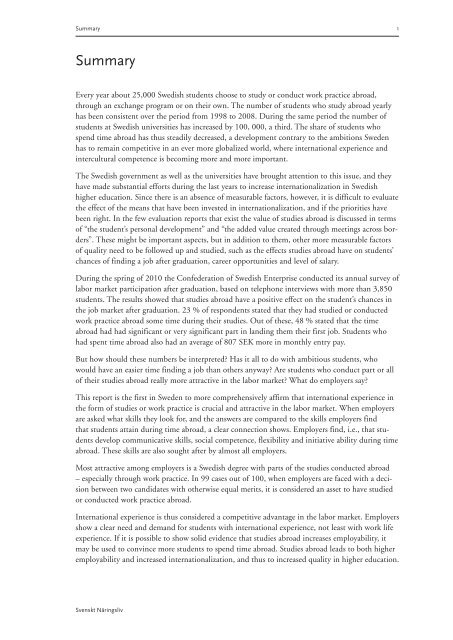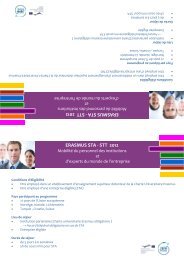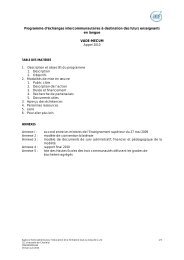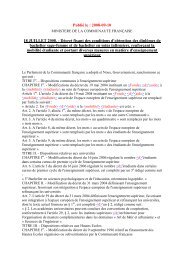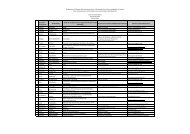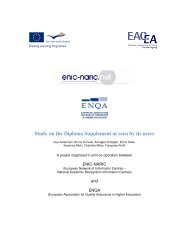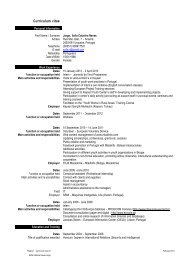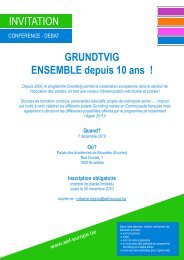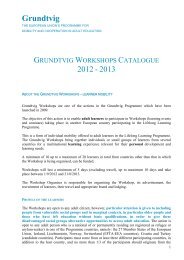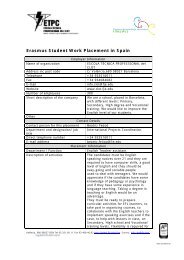Employers' view on studies abroad - Svenskt Näringsliv
Employers' view on studies abroad - Svenskt Näringsliv
Employers' view on studies abroad - Svenskt Näringsliv
You also want an ePaper? Increase the reach of your titles
YUMPU automatically turns print PDFs into web optimized ePapers that Google loves.
Summary 1<br />
Summary<br />
Every year about 25,000 Swedish students choose to study or c<strong>on</strong>duct work practice <strong>abroad</strong>,<br />
through an exchange program or <strong>on</strong> their own. The number of students who study <strong>abroad</strong> yearly<br />
has been c<strong>on</strong>sistent over the period from 1998 to 2008. During the same period the number of<br />
students at Swedish universities has increased by 100, 000, a third. The share of students who<br />
spend time <strong>abroad</strong> has thus steadily decreased, a development c<strong>on</strong>trary to the ambiti<strong>on</strong>s Sweden<br />
has to remain competitive in an ever more globalized world, where internati<strong>on</strong>al experience and<br />
intercultural competence is becoming more and more important.<br />
The Swedish government as well as the universities have brought attenti<strong>on</strong> to this issue, and they<br />
have made substantial efforts during the last years to increase internati<strong>on</strong>alizati<strong>on</strong> in Swedish<br />
higher educati<strong>on</strong>. Since there is an absence of measurable factors, however, it is difficult to evaluate<br />
the effect of the means that have been invested in internati<strong>on</strong>alizati<strong>on</strong>, and if the priorities have<br />
been right. In the few evaluati<strong>on</strong> reports that exist the value of <strong>studies</strong> <strong>abroad</strong> is discussed in terms<br />
of “the student’s pers<strong>on</strong>al development” and “the added value created through meetings across borders”.<br />
These might be important aspects, but in additi<strong>on</strong> to them, other more measurable factors<br />
of quality need to be followed up and studied, such as the effects <strong>studies</strong> <strong>abroad</strong> have <strong>on</strong> students’<br />
chances of finding a job after graduati<strong>on</strong>, career opportunities and level of salary.<br />
During the spring of 2010 the C<strong>on</strong>federati<strong>on</strong> of Swedish Enterprise c<strong>on</strong>ducted its annual survey of<br />
labor market participati<strong>on</strong> after graduati<strong>on</strong>, based <strong>on</strong> teleph<strong>on</strong>e inter<str<strong>on</strong>g>view</str<strong>on</strong>g>s with more than 3,850<br />
students. The results showed that <strong>studies</strong> <strong>abroad</strong> have a positive effect <strong>on</strong> the student’s chances in<br />
the job market after graduati<strong>on</strong>. 23 % of resp<strong>on</strong>dents stated that they had studied or c<strong>on</strong>ducted<br />
work practice <strong>abroad</strong> some time during their <strong>studies</strong>. Out of these, 48 % stated that the time<br />
<strong>abroad</strong> had had significant or very significant part in landing them their first job. Students who<br />
had spent time <strong>abroad</strong> also had an average of 807 SEK more in m<strong>on</strong>thly entry pay.<br />
But how should these numbers be interpreted? Has it all to do with ambitious students, who<br />
would have an easier time finding a job than others anyway? Are students who c<strong>on</strong>duct part or all<br />
of their <strong>studies</strong> <strong>abroad</strong> really more attractive in the labor market? What do employers say?<br />
This report is the first in Sweden to more comprehensively affirm that internati<strong>on</strong>al experience in<br />
the form of <strong>studies</strong> or work practice is crucial and attractive in the labor market. When employers<br />
are asked what skills they look for, and the answers are compared to the skills employers find<br />
that students attain during time <strong>abroad</strong>, a clear c<strong>on</strong>necti<strong>on</strong> shows. Employers find, i.e., that students<br />
develop communicative skills, social competence, flexibility and initiative ability during time<br />
<strong>abroad</strong>. These skills are also sought after by almost all employers.<br />
Most attractive am<strong>on</strong>g employers is a Swedish degree with parts of the <strong>studies</strong> c<strong>on</strong>ducted <strong>abroad</strong><br />
– especially through work practice. In 99 cases out of 100, when employers are faced with a decisi<strong>on</strong><br />
between two candidates with otherwise equal merits, it is c<strong>on</strong>sidered an asset to have studied<br />
or c<strong>on</strong>ducted work practice <strong>abroad</strong>.<br />
Internati<strong>on</strong>al experience is thus c<strong>on</strong>sidered a competitive advantage in the labor market. Employers<br />
show a clear need and demand for students with internati<strong>on</strong>al experience, not least with work life<br />
experience. If it is possible to show solid evidence that <strong>studies</strong> <strong>abroad</strong> increases employability, it<br />
may be used to c<strong>on</strong>vince more students to spend time <strong>abroad</strong>. Studies <strong>abroad</strong> leads to both higher<br />
employability and increased internati<strong>on</strong>alizati<strong>on</strong>, and thus to increased quality in higher educati<strong>on</strong>.<br />
<strong>Svenskt</strong> Näringsliv


